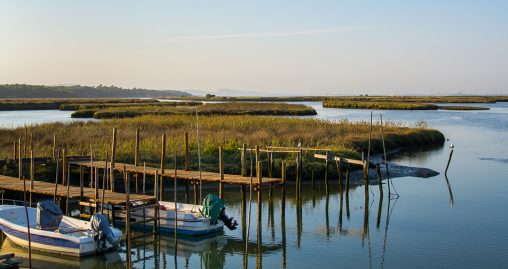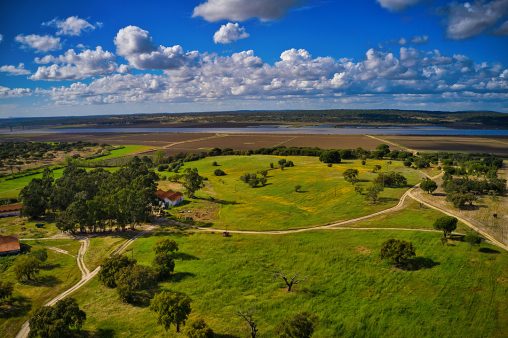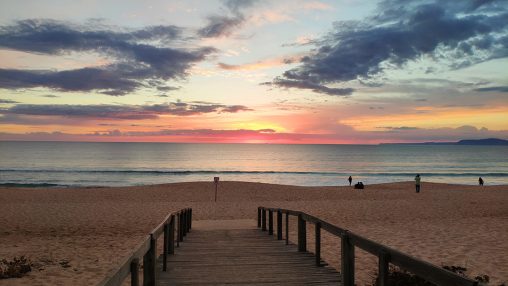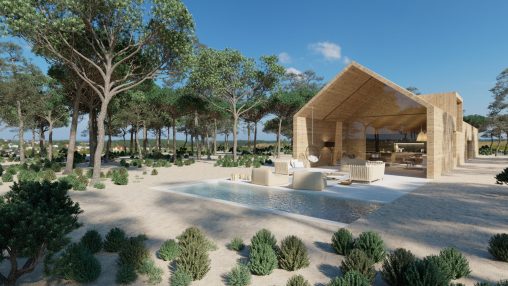Comporta – Portugal’s secret

Most people know of the Algarve, a region of gorgeous sandy beaches and coves backed by golden sandy cliffs, azure waters and a climate and culture not unlike that of the Costa del Sol, but a little further north, not too far from Lisbon, there is a secret natural paradise that lies as yet undiscovered.
Do you remember the times when Marbella was small, intimate and the private domain of local residents and international jet-set visitors? Probably not, for it was a while ago. Don’t worry, the same loss of virginal authenticity and exclusivity is shared by other beauty spots across the globe, which have long since lost the fight against mass-tourism and large-scale development. This makes it all the more exciting to discover an untouched natural paradise, not in some distant and exotic land, but close to Europe’s summer playgrounds.

The name of this virginal coastline backed by wooded groves and little country villages is Comporta, Portugal’s best-kept secret. Though there is a village at its heart, the name and concept of Comporta encompasses a natural and rural zone of some 150km2. The pristine shoreline is an extension of the equally untouched Alentejo coast, which extends north of the Algarve for over 100 kilometres, much of it part of a protected national park. This almost vertical northward succession of bays, coves, long sandy beaches and pine forests meets the estuary of the Sado River just beyond the old fishing village of Comporta, a quaint settlement of 1,500 souls surrounded by nature and endless views.
Pure nature
There are no high-rise buildings here, no hotels or property developments. Comporta is a shabby chic village in an idyllic setting surrounded by the sights and sounds of the ocean, pine forest and dunes. Just to north, the wetlands of the Sado estuary are also part of a natural reserve. It’s sandbanks and natural water canals glisten in the sunlight, a region rich in wildlife and aquatic birds. From Comporta, a long sand bank of beaches and dunes stretches out to the city of Setubal in the north, touching the point where the estuary meets the Atlantic Ocean. The historic city offers services, sites and famous seafood, but beyond it lies the Costa de Arrabida, a very different but equally beautiful shoreline where cliffs plunge into aquamarine waters.

Lisbon is some 45 minutes away, and this is where most of Comporta’s high society visitors have traditionally come from. It has been a secret paradise for a lucky few and therefore protected from mass-development thanks to the fact that most of the land here belonged to the Espirito Santo family, prominent Portuguese bankers whose Banco Espirito Santo fell onto hard times during the financial crisis. This, in turn, has led to the opening up of Comporta, where zonal planning is however extremely strict. The intention is to allow development, but control it and allow no high-rise structures or clustering of buildings. A few small, ultra-exclusive boutique hotels will be allowed, but no major road building or big complexes.
A high-society destination
Instead, only cottage bungalows and villas can be built, with a ratio of land to construction space that ensures each one is surrounded by acres of land. Gardens can be laid, yet the emphasis is on natural materials and sustainable building, with architectural styles that blend in with nature and are in keeping with the setting. The result is a gradually growing collection of low-rise homes enveloped by gardens and pine trees that usually blend modern architecture and a very natural, rustic chic feel. As a result, Comporta is the embodiment of shabby chic, and this extends to the charming eateries, shops and cafés in the nearby village.
Not surprisingly, the area has become the new darling of European and international high society, discovered first by Spanish and French visitors and buyers, and now also by discerning people from across Europe and North America keen to get away from the congestion, crowding, pollution and at times anti-social environment of mass tourist destinations. The names of those who visit and own properties here – Richard Branson, Philippe Starck and it is rumoured also French, Spanish and American actors, royals and business tycoons – add to the mystery and standing of this coastal area, which not so long ago hadn’t been heard of by most people, let alone seen or visited.

For many who are drawn to it now, this is exactly how they would like to keep it, for in a world of overdevelopment and spoiled former paradises, Comporta offers a natural paradise with simple, authentic pleasures that is a rarity these days. At one hour from Lisbon’s international airport, it is a gem that is free of heavy flows of traffic, crowded beaches and noisy throngs of tourists, though even so the village can get a little congested at the height of summer. In a process that stretches back to the 1950s, the locals must be bemused by all the fuss, but for those not fortunate to grow up in a natural coastal paradise, where pine groves merge into dunes, which bend into beaches, where the ocean and sky open up before you, this is more special than ever.
Nature, space, big skies, simple but delicious seafood, a diversity of natural scenery, and the coming together of a gentrified class of visitor give Comporta an air that is hard to find in Europe. For many who remember the halcyon days of summer holidays in iconic spots such as Marbella, Sotogrande, St Tropez and other centres of Mediterranean idyll, it represents a precious opportunity to rekindle memories of a more natural, gentle and innocent existence.
First published in Essential Magazine
Photography: Shutterstock & Comporta Signature












